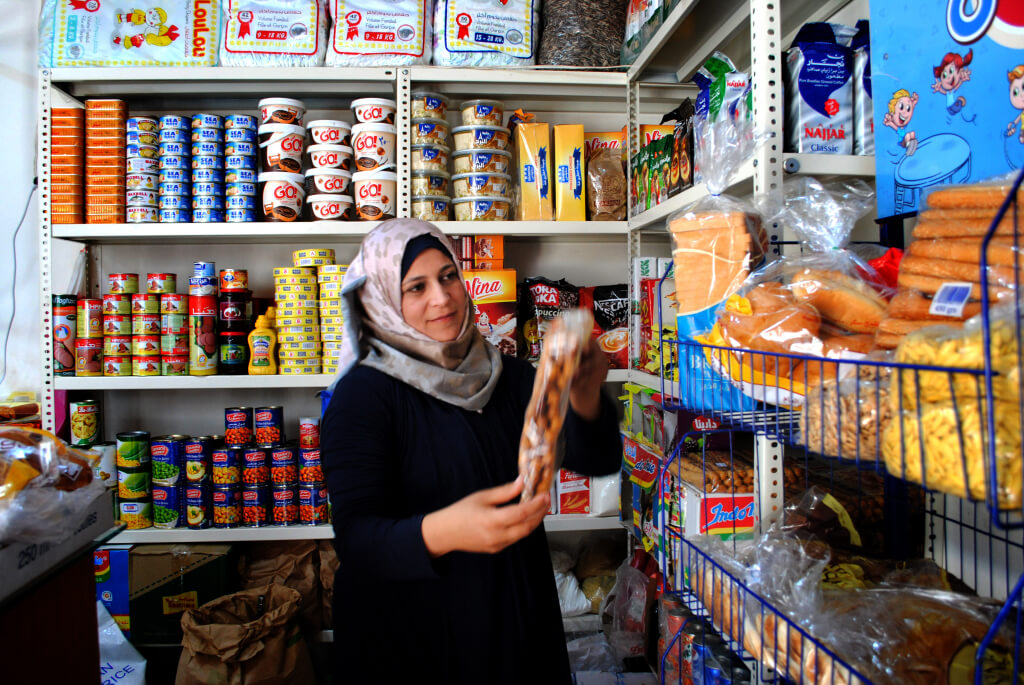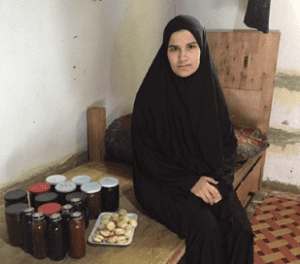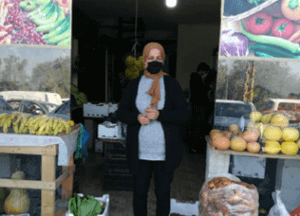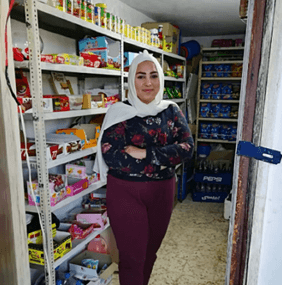
These participant profiles reflect more than 3,000 entrepreneurs the Near East Foundation (NEF) has supported in Lebanon through its work with the US Bureau of Population, Refugees and Migration (BPRM) and local partners, including Hadatha, arcencial, and Sanabel el Nour, to build resilience among Syrian refugees and vulnerable Lebanese.
Mona Ahmad Nasser
Food Processing
Mona is a 61-year-old Syrian refugee that lives in Miniara Camp with her husband, daughter, and grandchildren. She is the only provider for the household. Her husband has been unable to find work due to the economic crises in Lebanon and restrictive rules and regulations governing Syrian workers. Prior to her participation in NEF’s program in Lebanon, Mona relied on financial support from international organizations to buy food for her family.
By establishing a business, Mona hoped to improve her economic situation and provide for her family without relying on aid. NEF’s vulnerability assessment determined that Mona met the criteria to participate in the project, giving her access to NEF trainings and a team of people dedicated to bringing her idea for a small business to life.
Mona attended an online business development and protection training and submitted a feasibility plan for her home-based business. She shared that she enjoyed learning how to start and manage her home-based business through the Siraj Digital e-learning platform, using WhatsApp on her phone. Through the trainings, Mona learned how to prepare a business plan, how to market and sell her products, and how to calculate her costs and profit.
After Mona completed the training, she received a grant from NEF to buy the raw materials and supplies she needed to launch her business. She started making pickles, jams, and dairy products to sell in the camp. Her business has contributed greatly to a rise in her household income, from 50,000 LBP monthly to 300,000 LBP. Having this stable income allows her to buy household supplies and medications when needed.
“Starting my home-based business improved the living conditions for my family and made me become self-confident so, as a woman, I am able to work and stand by my husband in this difficult situation. Also, my husband started helping me by buying raw materials so I can make pickles, jams, and dairy products and sell them to the camp.”
In response to the COVID-19 pandemic, Mona started taking stricter hygienic measures. The Siraj Center in Halba provided her with hygiene kits and helped make sure she was equipped to follow the strict hygiene practices necessitated by the pandemic.
During a coaching and networking follow-up call, Mona said that she hopes to increase her production and have more customers, not only inside the camp but also in the surrounding area. Eventually, she hopes to see her products on the shelves of supermarkets.
Alaa Abdullah Khalaf
Food Processing

Alaa is a 24-year-old Syrian refugee currently residing in Miniara Camp in Akkar, Lebanon with her husband and mother. The family used to rely on a small stipend from an international organization to buy their necessities.
When Alaa connected with her local Siraj Center in Halba, she was eager to get back to learning, having left the formal school system following elementary school. She attended a five-day business development training, which was conducted online using the Siraj Digital e-learning platform due to the COVID-19 pandemic.
After Alaa finished her training, she received a grant from NEF to start making and selling the Middle Eastern sweets that she learned from her mother, like Nammoura, Baklava, and Barazek. She also began selling honey. Through her home-based business, Alaa makes a net profit of approximately 120,000 LBP per month.
From the business development training, she learned the importance of understanding and responding to customer demand. When the pandemic started and customers were looking for natural remedies to strengthen their immune system, Alaa increased her sales of honey and made approximately 600,000 LBP as a net profit in the first season in the camp. Alaa is a beekeeper and had three hives near her tent. In the summer, the bees go to nearby orchards to absorb the nectar of the flowers. With the high demand, she is able to sell her own honey as well as honey produced by others.
Alaa says that the NEF program improved her economic situation and taught her to look for what customers want and to adapt to the changes in the environment. She feels more confident now that she is more self-reliant.
Rajaa Farzat Al Hassayan
Dairy Production
Rajaa is a married 22-year-old Syrian refugee living in Miniara Camp in Lebanon, and is the only provider for the family as her husband is unemployed. Rajaa has experience in dairy production: she makes yogurt, labneh, and cheese and sells it to other women in the camp.
With the support of business development and protection trainings through Siraj Digital, Rajaa was able to leverage this experience into a profitable at home business. Selling dairy products has helped her to create a stable income for her household, allowing them to buy food and necessities. Rajaa shared that this increased self-reliance also improved her confidence.
She used a grant from NEF to buy a used refrigerator to store finished products and a cooker to pasteurize the milk before starting production. She was also able to purchase raw materials, basic tools, and packaging for her finished products. She contracted with a shop near the camp to sell her products. Her monthly net profit is around 150,000 LBP, which is enough to cover her household expenses.
When asked about her experience with the training, Rajaa said: “I enjoyed the training and learning from home though WhatsApp. The financial part of how to calculate monthly income, net profit, and monthly expenses helped me the most for my home-based business. I learned the importance of bookkeeping and write everything down to keep track of my financials.”
Halima Hussein Bahshoush
Vegetable Shop

Halima is a 43-year-old Lebanese woman, who lives in Halba with her husband, a day laborer, and their family. Before Halima was introduced to NEF, she dreamed of opening a grocery store, but she lacked the money or experience to do it. NEF invited Halima to participate in a five-day business development and protection training through the Siraj Digital e-learning platform. Through the training, she was able to learn how to open and manage her own business from home.
After she submitted her business plan, Halima participated in additional training focused on marketing and trade. Here she learned how to find wholesalers, how to deal with her customers, and how to stay competitive with other grocery stores in the area. After she finished both trainings, Halima was provided with a NEF grant, which she used to rent a small storefront.
“This experience changed my life. [I went] from being unemployed and staying at home to waking up daily excited to work in the shop.” When asked about her ambition for the future, Halima explained that she hopes to increase the capital of her shop and expand, by adding even more varieties of fruits and vegetables.
Taghrid Ismail Al Darkoushi
Grocery Shop

Taghrid is a single 23-year-old Lebanese woman, living in the village of Khraybet El Jundi with her parents. Despite the economic crises in Lebanon and the high unemployment rate, Taghrid was committed to creating her own opportunity: becoming an entrepreneur to help support her family.
Taghrid loves learning and she believes in the importance of hard work. She brought these values to her five-day business development and protection training with NEF. Throughout her training, she learned how to deal with customers and how to manage the bookkeeping for her business. When she was asked about her business idea, Taghrid knew exactly what she wanted to do: open a home-based grocery store. She had even thought through how to decorate the store, what inventory to buy, and how to calculate her net profit.
As soon as she received her start-up grant from NEF, she transformed an empty room into a small grocery store. Taghrid is thrilled that she can now depend on herself and help her family in these harsh conditions. She shared: “This training and grant gave me hope and made me more optimistic. I learned how to be responsible, self-reliant, and have self confidence in myself and [my] capabilities. I can now pay for my education and help my family in the household expenses. My dream for the future is to expand my business from a small grocery shop into a supermarket.”
Khaldiya Ahmad Al Mohamad
Grocery Shop
Khaldieh is a 50-year-old Lebanese woman who lives in Khraybet El Jundi, Lebanon with her husband and children. Her husband works at the local municipality, but his monthly income is not enough to provide for the family.
Khaldiya participated in the five-day NEF business development and protection training, through the Siraj Digital e-learning platform. She used WhatsApp to join the trainings from home. Khalidya learned how to start and manage her own home-based business to help support her family during the economic crisis, and the ensuing inflation that has made basic goods more expensive.Through the training, she learned the importance of daily bookkeeping and reinvesting part of the money she earned into buying more products for her store to increase the grocery store’s capital.
After completing her training with NEF, she received a start-up grant and transformed a room under her house into a grocery store. She started selling cans, candies, and detergents to her neighbors in the village. She adapted her wares based on customers’ needs, stocking the products that were in highest demand. Khalidya also made sure to treat everyone with the best customer service.
She said: “Opening my own grocery store made me feel confident and optimistic because I can pay for my children’s school fees and make sure they can have their education.”
Khalidya kept reinvesting into her small grocery store, like she learned in the training, until her capital increased from 150,000 LBP to 1,500,000 LBP. Her household monthly income for her and her husband combined increased from 700,000 LBP to 1,000,000 LBP, with her own income increasing from none to 300,000 LBP per month. She is hopeful and optimistic for the future. Her dream is to turn this grocery store into a supermarket.
Dina Walid Al Mohamad
Online Wedding Services
Dina is a 26-year-old Lebanese woman living in Akkar, Lebanon.
Through a vulnerability assessment conducted by NEF’s partner, arcenciel, Dina was selected to participate in business development and protection training through the Siraj Digital e-learning platform. Through the online training, she learned how to differentiate her products from others in the market, how to develop a competitive advantage, and how to offer added value for her customers. She knew that there was local demand for event decorating, particularly for weddings. Through her business training, she learned how to turn this idea into a business.
Dina decided to open an online shop, rather than a physical storefront, to minimize expenses. This was based on the knowledge that most people have access to social media platforms and that this would be a very cost-effective way to market her business while reaching customers in the region. She used a start-up grant from NEF to buy her supplies. Dina spoke to her ambitions, saying: “I hope in the future to expand my business more and to have my own store.”